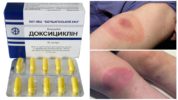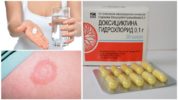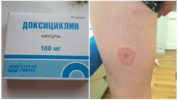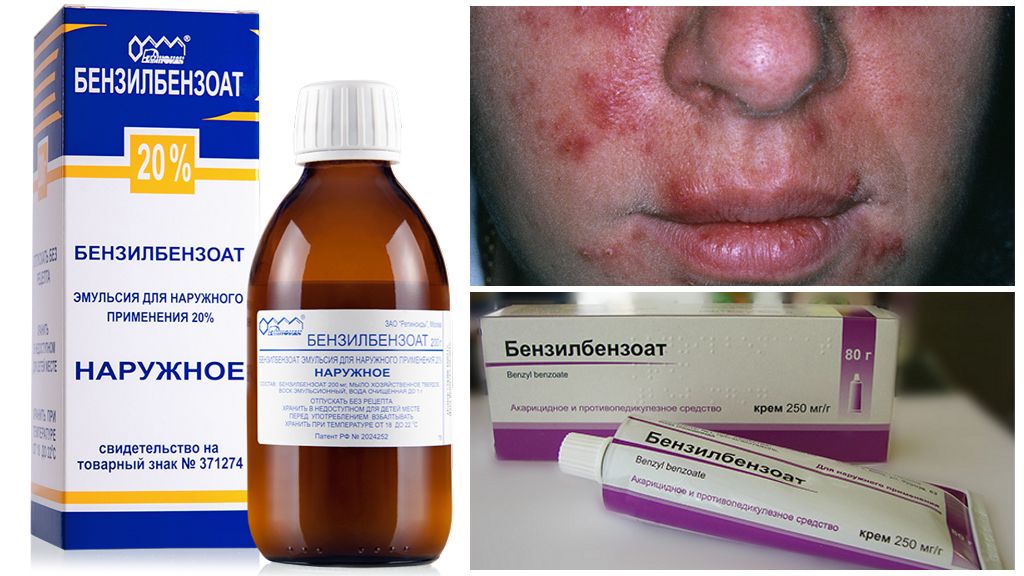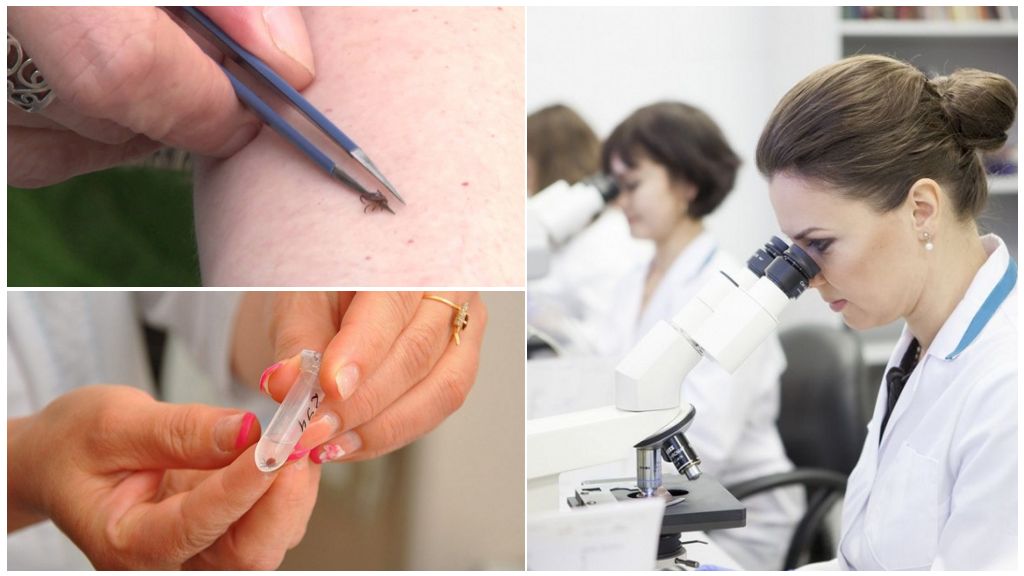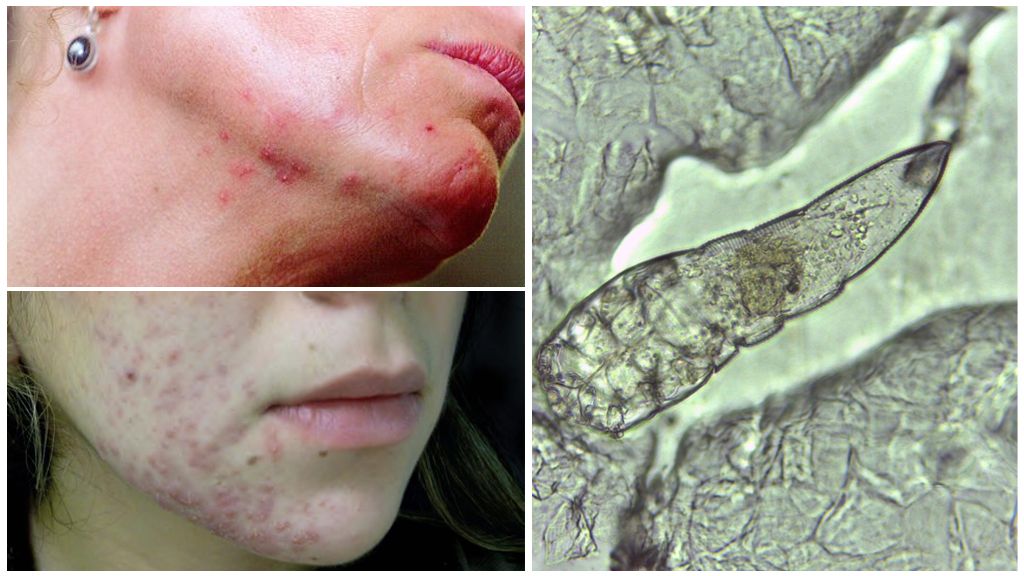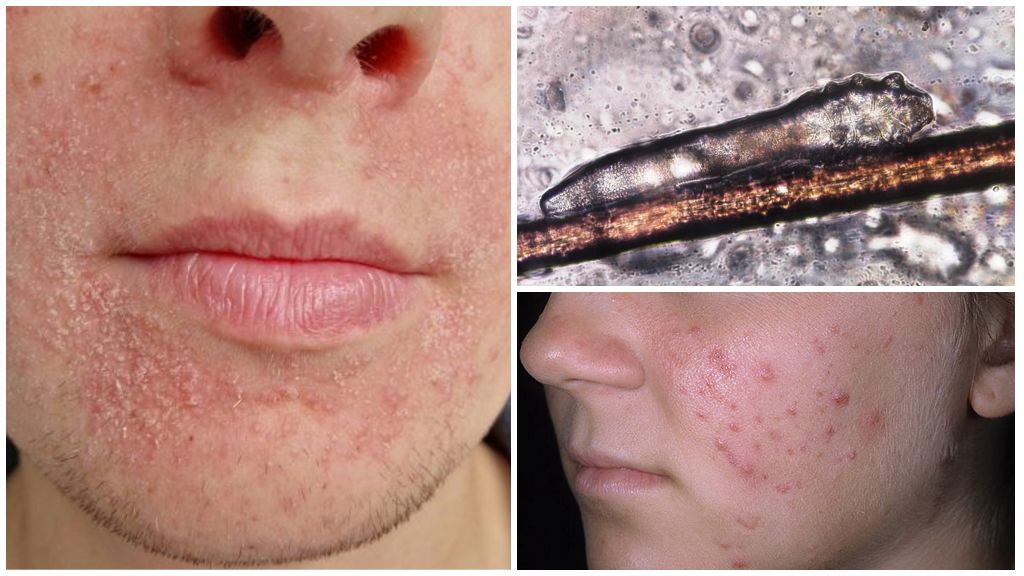- Doxycycline with Borreliosis
- Doxycycline with Borreliosis
- Doxycycline with Borreliosis
- Contraindications to taking doxycycline
With the onset of spring sunny warm days, nature begins to come to life, and various insects appear. From April to May, and also closer to the fall from August to September, they are activated ticks. They attack people resting in nature, near ponds, walking in parks or working in their summer cottages. Animals also become victims of these blood-sucking parasites. Tick bite not at all harmless. It can lead to infection with such a dangerous disease as borreliosis or Lyme disease. Antibiotics are used for treatment and prevention, most often doxycycline. Self-treatment is strictly contraindicated. The treatment regimen for doxycycline for borreliosis is determined solely by the doctor.
What is borreliosis
Carriers of infection are ticks of the genus Ixodes. On the territory of Russia there are two types of bloodsucking, which can be carriers of a dangerous disease:
- Borrelia afzelii;
- Borrelia garinii.
Arthropods infected with gram-negative spirochete bacteria infect a person or animal through saliva, which they inject into the wound during a bite. Mites themselves can become infected with spirochetes from wild or domestic animals, birds or rodents.
Interesting!
Not all animals become infected with Lyme disease after being bitten. Often, cats, goats and rats become just carriers of tick-borne borreliosis. This is the main danger: an infected animal does not look different from a healthy one, but with direct contact it can pose a serious danger to human health.
Borreliosis is a dangerous disease that can seriously disrupt the functioning of the cardiovascular, central nervous, skeletal and immune systems. As a result of the defeat of many organs, a person can even die. Borreliosis treatment It is produced in a complex using antibiotics, one of which is doxycycline.
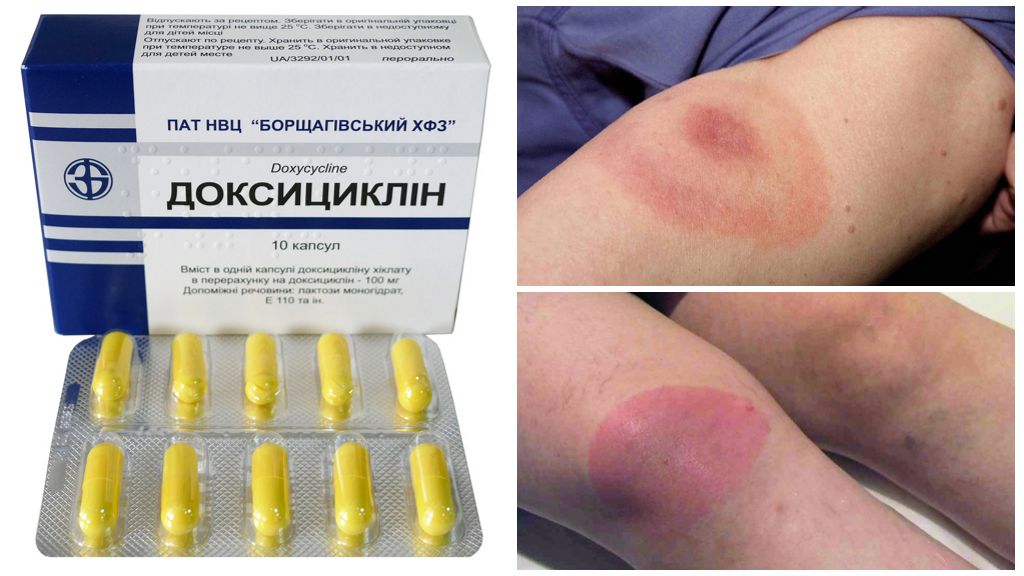
Description of the drug
Doxycycline is a broad-spectrum antibiotic of the tetracycline group. The drug is semi-synthetic. Active active ingredient: doxycycline cyclate - a yellowish powder with a greenish tint. It contains auxiliary components - calcium stearate, lactose monohydrate, glycerin, potato starch, dyes. Available in yellow capsules. Each capsule contains 100 mg of the substance. Country of origin - Belgium, the trade name Unidox is solutab, the price is 344 rubles. Doxycycline is also available in Russia in the form of:
- powder in ampoules (diluted for intravenous infusion);
- capsules - the price is about 24 to 29 rubles.
On a note!
Antibiotics from both manufacturers are equally effective.
Pharmacological action and purpose
The action of the antibiotic is based on the fact that, when bacteria enter the cell, it destroys the mechanism of formation of new protein structures, preventing new bacteria from reproducing. The drug is effective against many types of gram-positive and gram-negative aerobic bacteria, such as:
- staphylococci, streptococci, enterococci;
- shigella, salmonella, E. coli, legionella and many others;
- chlamydia, mycoplasma.
The antibiotic is prescribed for many diseases of the upper respiratory tract, skin lesions, urogenital and intestinal infections, malaria and tick-borne borreliosis, plague, cholera, anthrax and other dangerous infections.
On a note!
Lyme disease begins to develop immediately after a tick bite, but the incubation period lasts for two weeks. In order not to lose precious time and not start the disease, doxycycline with borreliosis must be taken immediately after the attack of the parasite.
Recommendations for use
The treatment regimen for doxycycline for borreliosis is determined only by the doctor in accordance with the severity of the disease, the general state of human health and its individual characteristics.
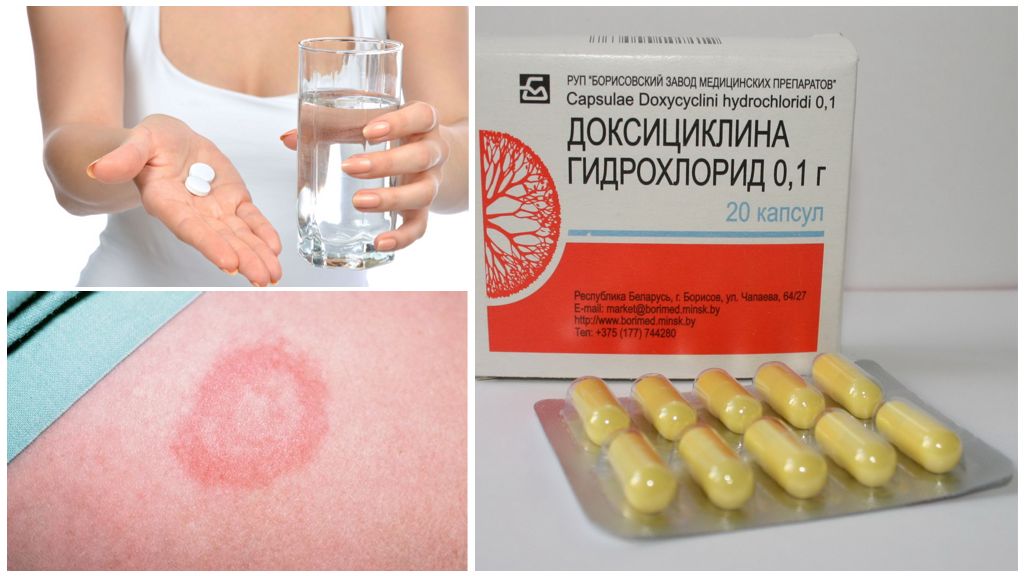
But there are such general recommendations:
- The first day, infected patients are prescribed a shock dose of an antibiotic in the amount of 200 mg. In severe forms, you can increase the dosage of Doxycycline to 600 mg per day, if it is prescribed in tablets or capsules. Only 300 mg of the drug is administered intravenously. All dosages are valid for adult patients and children over 14 years old. In the future, the amount of antibiotic per dose is halved.
- Prevention of borreliosis after a tick bite lasts from 5 to 10 days. Depending on the clinical picture of the disease, the doctor decides on the duration of the antibiotic.
- In the first stage of the disease, patients over 14 years old take 1 capsule twice a day for 20-30 days.
- It is possible to take a daily dose in one day, but with an interval of 12 hours.
- Doxycycline cannot be taken on an empty stomach. Taking the drug is allowed only during or after a meal.
- Children from 9 to 14 years old are recommended to prescribe an antibiotic at the rate of 2-6 mg of substance per kilogram of weight. In severe forms of borreliosis, the daily dose is calculated by the attending physician.
- Intravenous administration of a liquid form of doxycycline requires a long time up to 4 hours.
Important!
During the treatment of borreliosis, you need to pay attention to the composition of the taken vitamin complexes, since the incoming components: calcium or iron can weaken the effect of the antibiotic.
Taking the drug
Take Doxycycline strictly in accordance with the instructions, following certain rules:
- drink the drug only with drinking water, dairy products are not allowed, as they reduce the effectiveness of the active substance;
- give up alcohol and smoking for the period of treatment of the disease or while taking Doxycycline to prevent borreliosis;
- do not eat acidic and spicy foods, such as: tomatoes, spices, onions, garlic, spicy sauces;
- do not take blood thinners and fat-soluble vitamins;
- refrain from performing work requiring fast active movements;
- do not refuse to take an antibiotic until the end of treatment.
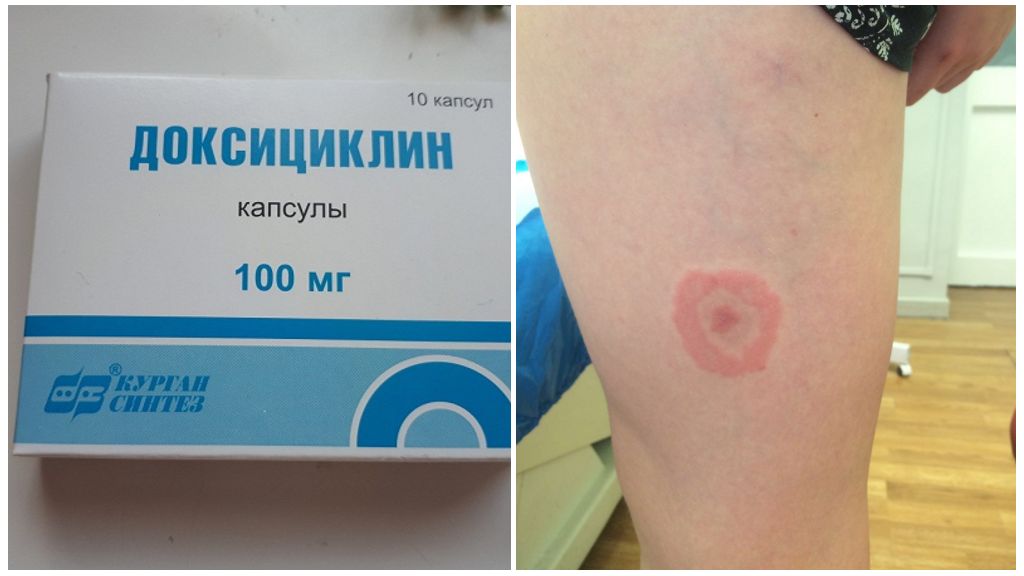
Following these simple rules, you can get the maximum benefit from the use of Doxycycline and cope with the disease.
Side effects
No matter how wonderful the drug is, which has proven to be highly effective in the treatment of any disease, it always has a “reverse side of the coin,” which gives undesirable side effects. This statement is true for Doxycycline. This antibiotic can cause:
- nausea
- stool disorders;
- lack of appetite;
- migraine headaches;
- the appearance of dizziness and disorders in coordination of movement;
- increased intracranial pressure;
- changes in the structure and color of tooth enamel;
- allergic reactions with itching and redness of the skin.
On a note!
All these negative phenomena, except for changes in tooth enamel, disappear after stopping the use of Doxycycline, but these conditions must be experienced steadily so as not to be in a more difficult position due to complications caused by borreliosis.
Contraindications
Like all antibiotics, the drug has several limitations in which its use is prohibited:
- children under 8 years old;
- nursing mothers or women expecting a baby;
- with liver diseases,
- lupus erythematosus;
- allergies to dairy products;
- with dysbiosis, lactose deficiency, dystrophy;
- with a negative reaction to the individual components of the antibiotic.

In all other cases, the drug is taken in strict accordance with the instructions and the prescription of the doctor.
Summary
In the treatment and prevention of Lyme disease, doxycycline has been shown to be highly effective. Like all modern antibiotics, it has a number of side effects, but they do not outweigh the positive effect that it has in the fight against sporechet borrelia. Thus, the use of Doxycycline is justified and recommended not only for the treatment of borreliosis, but also other dangerous infectious diseases.
Reviews
You can give a few reviews that only confirm all of the above.
We rested in the summer with my grandmother in the village. The son and the children often went to the forest and swim in the river. Once I came from a walk, and I noticed that the child scratches behind his ear all the time. I examined and saw a tick. He had not yet sucked so tightly, apparently he had recently picked up. Caution pulled out a tick a needle. There was nowhere to give for analysis. Lubricated the bite site alcohol and immediately began to give Doxycycline, which she brought in a medicine cabinet, with the aim of prevention. Drank the baby antibiotic for 7 days. There were no complications. The child did not get sick, but we became more attentive and examined him after each sortie into the forest and used repellents.
Tatyana, Moscow Region
I like fishing, so I often go on weekends to the river. I walk through the forest. Last month I was bitten by a tick. I noticed only at home when I went to take a shower. I noticed a tubercle under my arm. My wife pulled out a tick, we gave it for analysis. The doctor advised not to wait for the result, but to immediately start taking the antibiotic Doxycycline to avoid trouble if the tick is infectious. I took the drug for 10 days. I felt fine. Result tick analysis turned out to be negative, well and good. It’s still useful for prevention.
Anatoly, Samara
Working in the country, she caught a tick. We have a forest near, probably got out of there. I didn’t notice anything right away. By evening, a slight temperature rose. I thought that she had caught a cold, but when a red spot appeared on my hand and began to itch and swell, I immediately consulted a doctor. He pulled out a tick and sent it for analysis. I was prescribed the antibiotic Doxycycline. I drank it one capsule a day for a month. After a month passed tests for borreliosis, everything turned out to be normal. Very pleased with the drug. It helps well, I did not feel any side effects.
Valentina, Novomoskovsk
